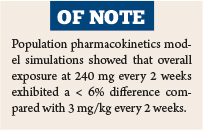In the Clinic provides overviews of novel oncology agents, addressing indications, mechanisms, administration recommendations, safety profiles, and other essential information needed for the appropriate clinical use of these drugs.
On September 13, 2016, the U.S. Food and Drug Administration modified the dosage regimen for nivolumab (Opdivo) for the currently approved indications for advanced renal cell carcinoma, unresectable/metastatic melanoma, and metastatic non–small cell lung cancer (NSCLC).1,2
Dose Modification for Nivolumab
- The recommended dosage regimens of nivolumab were modified to 240 mg IV every 2 weeks from 3 mg/kg IV every 2 weeks until disease progression or intolerable toxicity in renal cell carcinoma, melanoma, and NSCLC.
- Nivolumab is indicated for advanced classical Hodgkin lymphoma after autologous stem cell transplantation and posttransplant brentuximab vedotin; advanced renal cell carcinoma after antiangiogenic therapy; BRAF V600 wild-type unresectable or metastatic melanoma; and metastatic squamous NSCLC after platinum-based chemotherapy.
The recommended dosage regimens were modified to 240 mg intravenously (IV) every 2 weeks from 3 mg/kg IV every 2 weeks until disease progression or intolerable toxicity in renal cell carcinoma, melanoma, and NSCLC. For the combination of nivolumab with ipilimumab (Yervoy) in melanoma, the recommended nivolumab dosage of 1 mg/kg IV, followed by ipilimumab on the same day, every 3 weeks for 4 doses, remains the same; after completion of ipilimumab, the recommended nivolumab dose is changed to 240 mg every 2 weeks until disease progression or intolerable toxicity. The recommended nivolumab dose for classical Hodgkin lymphoma remains at 3 mg/kg IV every 2 weeks until disease progression or intolerable toxicity.
The approval of the modified dosage regimen was based on population pharmacokinetics and dose/exposure-response analyses demonstrating the similarity of pharmacokinetics exposure, safety, and efficacy of the new dosing regimen with the previously approved regimen. Population pharmacokinetics model simulations showed that overall exposure at 240 mg every 2 weeks exhibited a < 6%

difference compared with 3 mg/kg every 2 weeks. Such a difference in exposure is not considered likely to result in clinically meaningful differences in safety and efficacy, since dose/exposure-response relationships have been found to be relatively flat in the settings of advanced renal cell carcinoma, melanoma, and NSCLC. ■
References
1. U.S. Food and Drug Administration: Approved drugs: Modification of the dosage regimen for nivolumab. Available at http://www.fda.gov/Drugs/InformationOnDrugs/ApprovedDrugs/ucm520871.htm. Accessed October 12, 2016.
2. Opdivo (nivolumab) injection for intravenous use prescribing information, Bristol-Myers Squibb Company, September 2016. Available at http://www.accessdata.fda.gov/drugsatfda_docs/label/2016/125554s017s018lbl.pdf. Accessed October 12, 2016.
Report Adverse Events
Health-care professionals should report all serious adverse events suspected to be associated with the use of any medicine or device to FDA’s MedWatch Reporting System by completing a form online at http://www.fda.gov/medwatch/report.htm, by faxing (1-800-FDA-0178), by mailing the postage-paid address form provided online, or by telephone (1-800-FDA-1088).

